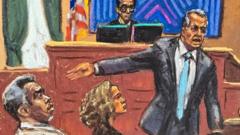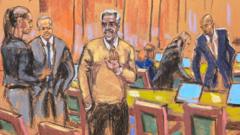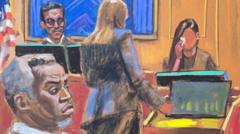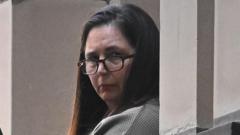The upcoming resentencing hearing marks a critical juncture for Erik and Lyle Menendez, who have spent over 30 years incarcerated for the 1989 murders of their wealthy parents.
Menendez Brothers Face Resentencing Hearing After Three Decades in Prison

Menendez Brothers Face Resentencing Hearing After Three Decades in Prison
A pivotal hearing may reshape the fate of the Menendez brothers, charged with killing their parents in a notorious case.
The highly anticipated resentencing hearing for Erik and Lyle Menendez is set to commence Tuesday, with the potential to alter the course of their lives after three decades behind bars. The brothers, convicted of murdering their affluent parents in the family's Beverly Hills mansion in 1989, are vying for a chance at reduced sentences, though the journey has been fraught with delays.
The prosecution argues that the brothers meticulously plotted the killings to inherit their parents' wealth, emphasizing their lack of accountability. Conversely, the Menendez brothers maintain that they acted in self-defense following a history of severe abuse from their father, who was a prominent figure in the film and music industry. The case has become a cultural phenomenon, inspiring literature, documentaries, and dramatizations, continuing to evoke strong reactions across the nation.
This two-day hearing, which will not be aired publicly, centers on the evidence and testimonies that will assess the brothers' time in prison and the extent of their rehabilitation. Key figures expected to testify include family members, correctional officers, and potentially behavioral scientists. Their attorney, Mark Geragos, has indicated he will prioritize family testimonies but remains undecided about whether to have the brothers testify given the risk of cross-examination by the prosecution.
While the focus of this hearing is not to reevaluate the Menendez brothers' guilt, it will delve into their conduct during imprisonment and any signs of reform. During their original trials, the prosecution painted the brothers as privileged individuals driven by greed, while the defense argued a narrative of survival against addiction and abuse, claiming that they were responding to a lifetime of trauma.
The first trial culminated in a mistrial, but a retrial in 1996 led to their conviction on charges of first-degree murder, despite many of their abuse claims being excluded from evidence. As the spotlight hasn't faded from this saga—recently reignited by a Netflix drama—criminal justice reform advocates, including former Los Angeles District Attorney George Gascón, have expressed support for their resentencing, while current DA Nathan Hochman remains staunchly opposed, citing a lack of genuine accountability on the part of the brothers.
As the Menendez brothers approach this significant hearing, questions linger: Will they be granted a chance at freedom, or will they remain incarcerated, bearing the weight of a case that has captivated much of America for decades?
The prosecution argues that the brothers meticulously plotted the killings to inherit their parents' wealth, emphasizing their lack of accountability. Conversely, the Menendez brothers maintain that they acted in self-defense following a history of severe abuse from their father, who was a prominent figure in the film and music industry. The case has become a cultural phenomenon, inspiring literature, documentaries, and dramatizations, continuing to evoke strong reactions across the nation.
This two-day hearing, which will not be aired publicly, centers on the evidence and testimonies that will assess the brothers' time in prison and the extent of their rehabilitation. Key figures expected to testify include family members, correctional officers, and potentially behavioral scientists. Their attorney, Mark Geragos, has indicated he will prioritize family testimonies but remains undecided about whether to have the brothers testify given the risk of cross-examination by the prosecution.
While the focus of this hearing is not to reevaluate the Menendez brothers' guilt, it will delve into their conduct during imprisonment and any signs of reform. During their original trials, the prosecution painted the brothers as privileged individuals driven by greed, while the defense argued a narrative of survival against addiction and abuse, claiming that they were responding to a lifetime of trauma.
The first trial culminated in a mistrial, but a retrial in 1996 led to their conviction on charges of first-degree murder, despite many of their abuse claims being excluded from evidence. As the spotlight hasn't faded from this saga—recently reignited by a Netflix drama—criminal justice reform advocates, including former Los Angeles District Attorney George Gascón, have expressed support for their resentencing, while current DA Nathan Hochman remains staunchly opposed, citing a lack of genuine accountability on the part of the brothers.
As the Menendez brothers approach this significant hearing, questions linger: Will they be granted a chance at freedom, or will they remain incarcerated, bearing the weight of a case that has captivated much of America for decades?





















